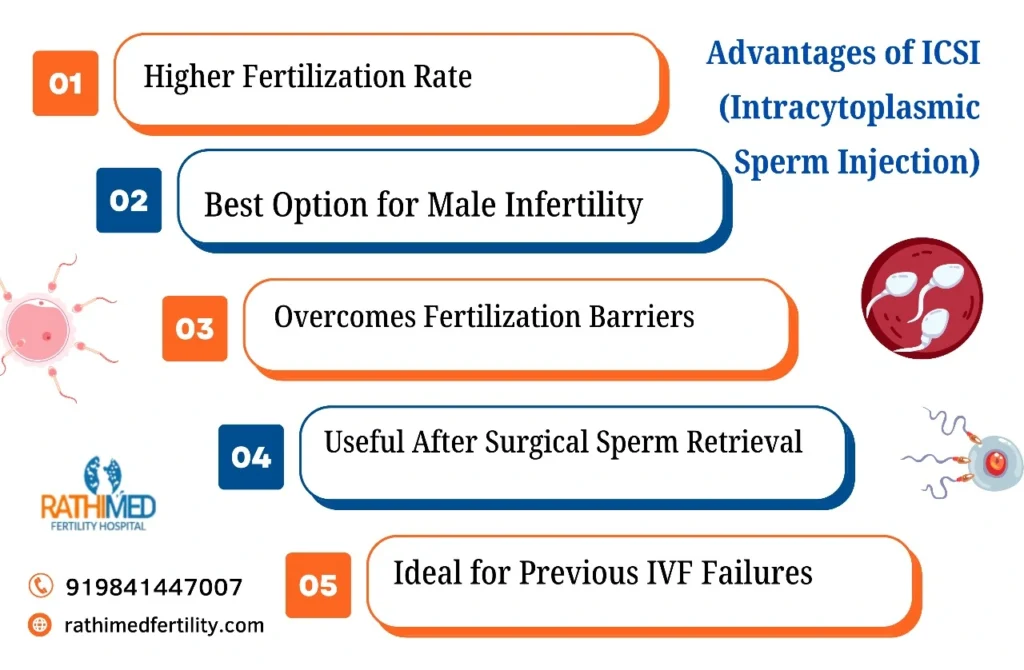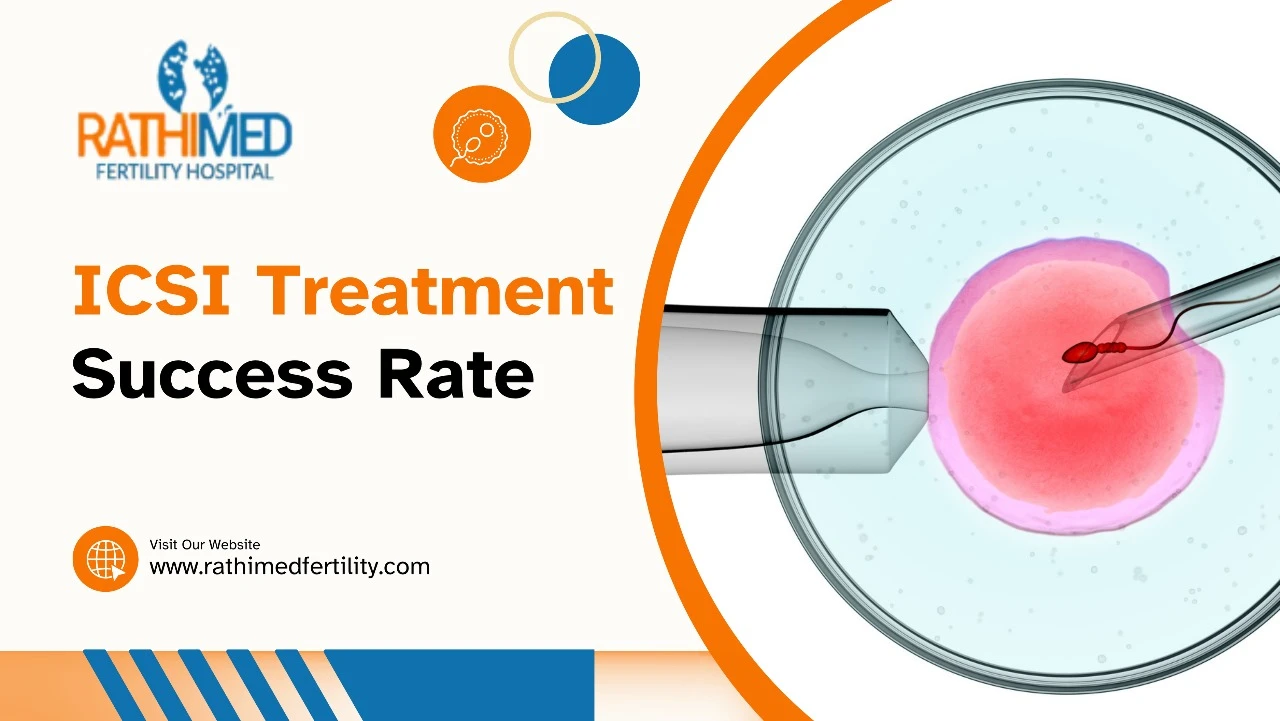When it comes to assisted reproductive technologies, Intracytoplasmic Sperm Injection (ICSI) has become a breakthrough for many couples facing infertility. At Rathimed Fertility Centre, we believe informed decisions lead to better outcomes. Understanding the ICSI treatment success rate can help couples set realistic expectations and take steps to improve their chances of conception.
What is ICSI?
ICSI, or Intracytoplasmic Sperm Injection, is an advanced form of IVF (In Vitro Fertilization) in which a single healthy sperm is directly injected into a mature egg. This method is particularly beneficial when dealing with male infertility issues like low sperm count or poor sperm motility.
Unlike conventional IVF, which allows sperm to fertilize the egg in a dish naturally, ICSI ensures the sperm is placed right into the egg, enhancing the likelihood of fertilization.

Why Does ICSI Treatment Success Rate Matter?
The ICSI treatment success rate is a key factor for couples exploring fertility options. While ICSI has a higher fertilization rate compared to IVF, success depends on many variables. Being aware of these rates helps in making educated decisions and in preparing emotionally and financially for the journey ahead.
Globally, ICSI boasts a fertilization rate of about 70–85%. However, the ICSI treatment success rate, in terms of live birth, varies between 35% to 45%, depending on several influencing factors. Understanding these factors can help increase the chances of a successful pregnancy.

Factors Affecting ICSI Success Rate
Age of the Woman (ICSI Success Rate by Age)
Age is the most crucial factor in determining the ICSI success rate. Here’s a general look at the ICSI success rate by age:
- Under 30 years: 45–55%
- 30–34 years: 40–50%
- 35–37 years: 35–40%
- 38–40 years: 25–35%
- Above 40 years: 10–20%
As the woman’s age increases, egg quality and ovarian reserve decline, significantly affecting the chances of successful implantation and pregnancy.
Sperm Quality
Although ICSI can be used with even a single sperm, better sperm quality increases fertilization chances and embryo development. Abnormal sperm DNA can still result in poor embryo quality despite successful fertilization.
Embryo Quality
Healthy embryos are more likely to implant successfully. Embryo quality depends on both egg and sperm health, as well as the lab’s technology and processes.
Lifestyle and Health
Factors like smoking, alcohol, obesity, poor diet, and stress can negatively impact both sperm and egg quality, thereby reducing the ICSI treatment success rate.
What is the ICSI Success Rate at Rathimed Fertility Centre?
At Rathimed Fertility Centre, we follow a patient-first approach, offering personalized fertility care backed by world-class technology. Our average ICSI treatment success rate ranges between 50%–60% for women under 35, which is higher than many national averages.
What sets us apart?
- Highly skilled embryologists and fertility specialists
- Advanced embryology labs with time-lapse embryo monitoring
- Individualized stimulation protocols
- Holistic fertility support (diet, counseling, yoga, etc.)
Our dedicated team tracks every stage of your fertility journey, from ovarian stimulation to embryo transfer, to maximize your ICSI success rate.
How to Improve ICSI Treatment Success Rate
Here are expert-recommended tips from Rathimed Fertility Centre:
- Maintain a Healthy Weight: Obesity reduces fertility in both men and women.
- Eat Fertility-Friendly Foods: Include antioxidant-rich foods like leafy greens, berries, and seeds.
- Quit Smoking and Alcohol: These directly reduce sperm quality and egg viability.
- Manage Stress: Join yoga, meditation, or fertility counseling.
- Follow Medical Advice Strictly: Take medications and attend scans as prescribed.
- Avoid Environmental Toxins: Limit exposure to plastics, pesticides, and pollutants.
These steps may not guarantee results, but they significantly increase the chances of a successful outcome.
ICSI vs IVF: Which Has a Better Success Rate?
Both procedures aim to achieve fertilization, but ICSI offers an advantage when male infertility is involved. While standard IVF relies on sperm’s ability to penetrate the egg, ICSI manually injects sperm into the egg, overcoming natural barriers.
Studies show that ICSI treatment success rate is comparable to IVF in general, but in cases with sperm-related issues, ICSI may provide better fertilization outcomes.
Conclusion
ICSI has revolutionized fertility treatment, offering hope to many couples struggling to conceive. While the ICSI treatment success rate is encouraging, success depends on age, sperm and egg quality, and overall health.
At Rathimed Fertility Centre, we combine expertise, empathy, and advanced reproductive technologies to guide you every step of the way.
👉 Book a consultation today and take the first step toward your parenthood journey with confidence!
Also read, Best Treatment for Infertility.


